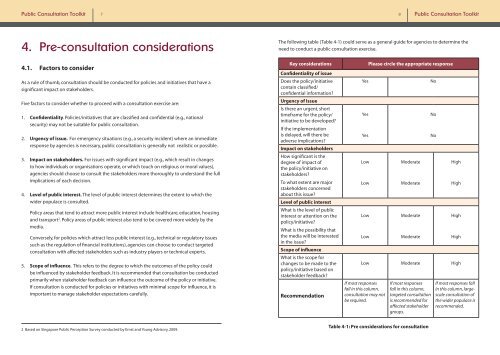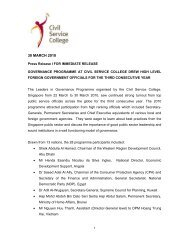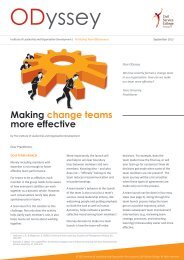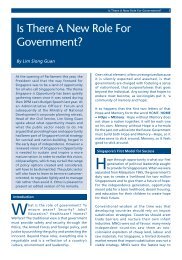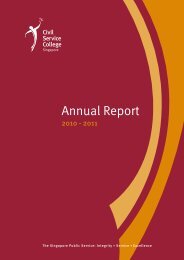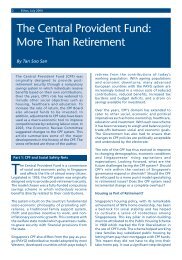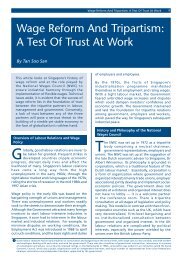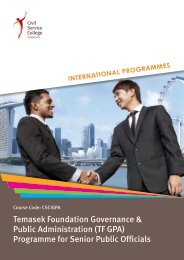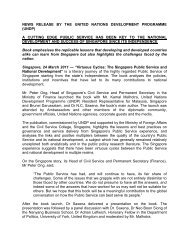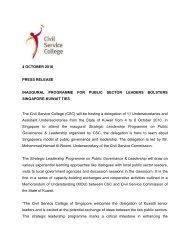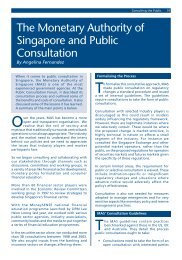Public Consultation Toolkit - Civil Service College
Public Consultation Toolkit - Civil Service College
Public Consultation Toolkit - Civil Service College
You also want an ePaper? Increase the reach of your titles
YUMPU automatically turns print PDFs into web optimized ePapers that Google loves.
<strong>Public</strong> <strong>Consultation</strong> <strong>Toolkit</strong> <strong>Public</strong> <strong>Consultation</strong> <strong>Toolkit</strong><br />
4. Pre-consultation considerations<br />
The following table (Table 4-1) could serve as a general guide for agencies to determine the<br />
need to conduct a public consultation exercise.<br />
4.1. Factors to consider<br />
As a rule of thumb, consultation should be conducted for policies and initiatives that have a<br />
significant impact on stakeholders.<br />
Five factors to consider whether to proceed with a consultation exercise are:<br />
1. Confidentiality. Policies/initiatives that are classified and confidential (e.g., national<br />
security) may not be suitable for public consultation.<br />
2. Urgency of issue. For emergency situations (e.g., a security incident) where an immediate<br />
response by agencies is necessary, public consultation is generally not realistic or possible.<br />
3. Impact on stakeholders. For issues with significant impact (e.g., which result in changes<br />
to how individuals or organisations operate, or which touch on religious or moral values),<br />
agencies should choose to consult the stakeholders more thoroughly to understand the full<br />
implications of each decision.<br />
4. Level of public interest. The level of public interest determines the extent to which the<br />
wider populace is consulted.<br />
Policy areas that tend to attract more public interest include healthcare, education, housing<br />
and transport 2 . Policy areas of public interest also tend to be covered more widely by the<br />
media.<br />
Conversely, for policies which attract less public interest (e.g., technical or regulatory issues<br />
such as the regulation of financial institutions), agencies can choose to conduct targeted<br />
consultation with affected stakeholders such as industry players or technical experts.<br />
5. Scope of influence. This refers to the degree to which the outcomes of the policy could<br />
be influenced by stakeholder feedback. It is recommended that consultation be conducted<br />
primarily when stakeholder feedback can influence the outcome of the policy or initiative.<br />
If consultation is conducted for policies or initiatives with minimal scope for influence, it is<br />
important to manage stakeholder expectations carefully.<br />
Key considerations<br />
Confidentiality of issue<br />
Does the policy/initiative<br />
contain classified/<br />
confidential information?<br />
Urgency of Issue<br />
Is there an urgent, short<br />
timeframe for the policy/<br />
initiative to be developed?<br />
If the implementation<br />
is delayed, will there be<br />
adverse implications?<br />
Impact on stakeholders<br />
How significant is the<br />
degree of impact of<br />
the policy/initiative on<br />
stakeholders?<br />
To what extent are major<br />
stakeholders concerned<br />
about this issue?<br />
Level of public interest<br />
What is the level of public<br />
interest or attention on the<br />
policy/initiative?<br />
What is the possibility that<br />
the media will be interested<br />
in the issue?<br />
Scope of influence<br />
What is the scope for<br />
changes to be made to the<br />
policy/initiative based on<br />
stakeholder feedback?<br />
Recommendation<br />
Yes<br />
Yes<br />
Yes<br />
Low<br />
Low<br />
Low<br />
Low<br />
Please circle the appropriate response<br />
Moderate<br />
Moderate<br />
Moderate<br />
Moderate<br />
No<br />
No<br />
No<br />
High<br />
High<br />
High<br />
High<br />
Low Moderate High<br />
If most responses<br />
fall in this column,<br />
consultation may not<br />
be required.<br />
If most responses<br />
fall in this column,<br />
targeted consultation<br />
is recommended for<br />
affected stakeholder<br />
groups.<br />
If most responses fall<br />
in this column, largescale<br />
consultation of<br />
the wider populace is<br />
recommended.<br />
2 Based on Singapore <strong>Public</strong> Perception Survey conducted by Ernst and Young Advisory, 2009.<br />
Table 4-1: Pre considerations for consultation


